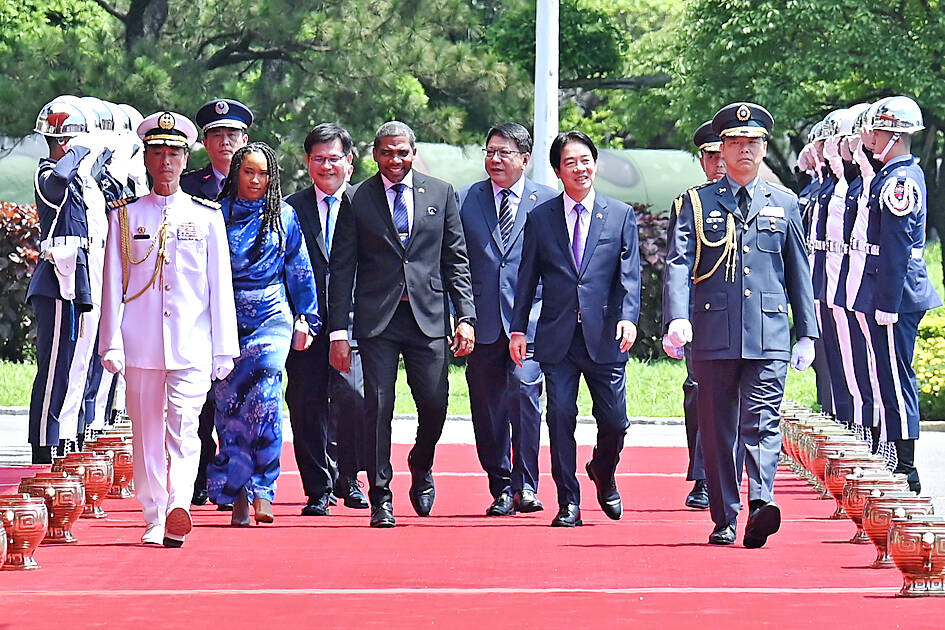Saint Kitts and Nevis Prime Minister Terrance Drew was yesterday welcomed with a military salute ceremony in Taipei.
Drew received a 19-gun salute in front of the Presidential Office Building, after which the national anthems of the two countries were played.
President William Lai (賴清德) and Drew then inspected the honor guards and military bands of the armed forces.

Photo: Tu Chien-jung, Taipei Times
Drew and his delegation arrived in Taiwan on Saturday for a five-day visit set to conclude tomorrow.
The prime minister said his visit to Taiwan held “great importance, as it fortifies the solid foundation [between the nations] built over four decades.”
Congratulating Lai on his election victory in January, Drew said he believed the president’s inauguration on May 20 marked “the beginning of a promising chapter for Taiwan and we look forward to strengthening our ties further under your guidance.”
He also expressed his gratitude to Taiwan for the decades of technical assistance and other support, capacity building and international advocacy it has given his country.
“As friends, the government of Saint Kitts and Nevis is always ready to use its influence at international forums to advocate for values and principles that we share with Taiwan,” he said.
Drew said he believed Taiwan “has a vital role” in the global economy with its exports of quality goods and services.
“Additionally, Taiwan’s contributions to global efforts in addressing pandemics, climate change adaptation and mitigation, disaster preparedness, food and livelihood security, and rapid urbanization, are all invaluable,” he said.
Lai said that Drew’s frequent visits to Taiwan demonstrated the leader’s high regard for bilateral ties.
Drew is making his second state visit to Taiwan since taking office in August 2022, having last visited in November 2022.
Lai said that both countries uphold the shared values of democracy and human rights, with bilateral partnership continuing to deepen across all domains since Taiwan and Saint Kitts and Nevis established diplomatic relations in 1983.
He also thanked Drew for “calling for justice and demonstrating staunch support for Taiwan on the international stage,” adding that both governments would work together to advance the well-being of their countries’ peoples.
Drew’s delegation includes his wife, Diani Jmesha Prince-Drew, and senior Cabinet members, including Saint Kitts and Nevis Minister of Foreign Affairs Denzil Douglas, Premier Mark Brantley, Cabinet Secretary Marcus Natta, Permanent Secretary of the Prime Minister’s Office Naeemah Hazelle, Special Envoy for Healthcare Frank Laws and Director General of Information Services Bernice Matthew.

The US government has signed defense cooperation agreements with Japan and the Philippines to boost the deterrence capabilities of countries in the first island chain, a report by the National Security Bureau (NSB) showed. The main countries on the first island chain include the two nations and Taiwan. The bureau is to present the report at a meeting of the legislature’s Foreign Affairs and National Defense Committee tomorrow. The US military has deployed Typhon missile systems to Japan’s Yamaguchi Prefecture and Zambales province in the Philippines during their joint military exercises. It has also installed NMESIS anti-ship systems in Japan’s Okinawa

‘WIN-WIN’: The Philippines, and central and eastern European countries are important potential drone cooperation partners, Minister of Foreign Affairs Lin Chia-lung said Minister of Foreign Affairs Lin Chia-lung (林佳龍) in an interview published yesterday confirmed that there are joint ventures between Taiwan and Poland in the drone industry. Lin made the remark in an exclusive interview with the Chinese-language Liberty Times (the Taipei Times’ sister paper). The government-backed Taiwan Excellence Drone International Business Opportunities Alliance and the Polish Chamber of Unmanned Systems on Wednesday last week signed a memorandum of understanding in Poland to develop a “non-China” supply chain for drones and work together on key technologies. Asked if Taiwan prioritized Poland among central and eastern European countries in drone collaboration, Lin

NO CONFIDENCE MOTION? The premier said that being toppled by the legislature for defending the Constitution would be a democratic badge of honor for him Premier Cho Jung-tai (卓榮泰) yesterday announced that the Cabinet would not countersign the amendments to the local revenue-sharing law passed by the Legislative Yuan last month. Cho said the decision not to countersign the amendments to the Act Governing the Allocation of Government Revenues and Expenditures (財政收支劃分法) was made in accordance with the Constitution. “The decision aims to safeguard our Constitution,” he said. The Constitution stipulates the president shall, in accordance with law, promulgate laws and issue mandates with the countersignature of the head of the Executive Yuan, or with the countersignatures of both the head of the Executive Yuan and ministers or

BACK TO WORK? Prosecutors said they are considering filing an appeal, while the Hsinchu City Government said it has applied for Ann Kao’s reinstatement as mayor The High Court yesterday found suspended Hsinchu mayor Ann Kao (高虹安) not guilty of embezzling assistant fees, reducing her sentence to six months in prison commutable to a fine from seven years and four months. The verdict acquitted Kao of the corruption charge, but found her guilty of causing a public official to commit document forgery. The High Prosecutors’ Office said it is reviewing the ruling and considering whether to file an appeal. The Taipei District Court in July last year sentenced Kao to seven years and four months in prison, along with a four-year deprivation of civil rights, for contravening the Anti-Corruption